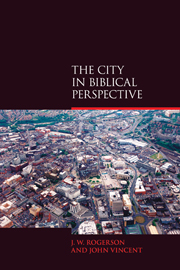Book contents
- Frontmatter
- Contents
- Preface
- Part 1 The city in the Old Testament
- Part 2 The City in the New Testament
- Chapter 4 Introduction: the Political Situation
- Chapter 5 The City and the World of Jesus
- Chapter 6 The City and the First Christians
- Chapter 7 Perspectives for our Cities
- Epilogue
- Bibliography
- Index of Biblical References
- Author Index
- Subject Index
Chapter 7 - Perspectives for our Cities
from Part 2 - The City in the New Testament
- Frontmatter
- Contents
- Preface
- Part 1 The city in the Old Testament
- Part 2 The City in the New Testament
- Chapter 4 Introduction: the Political Situation
- Chapter 5 The City and the World of Jesus
- Chapter 6 The City and the First Christians
- Chapter 7 Perspectives for our Cities
- Epilogue
- Bibliography
- Index of Biblical References
- Author Index
- Subject Index
Summary
Coherence with God's Project
The existence today of “the global city” presents new challenges (Green, 2001; Davey, 2002; Commission on Urban Life, 2006: 36–37). Britain belongs to “the global market”, and everything we do is influenced by that fact. Our cities are merely the local manifestations of global realities.
The New Testament is precisely about an alternative globalization Project, which is “God's Project”. In Jesus's day, the global system was the Roman Empire, with its head and “first man”, Caesar Augustus, who was Son of God, Saviour and Prince of Peace. Jesus's claim was that there was now an alternative global system, the Kingdom of Heaven on Earth, and his followers championed its own “first man”, the man Jesus of Nazareth, claimed also to be Son of God, Saviour and Prince of Peace.
New Testament discipleship, ethics, Christology and theology are all based on the prime question: How can I, who am now a citizen of this new Kingdom of God present on earth, survive as a counter-cultural community, and be prophetic and redemptive for the whole world, while I am still living in a world totally dominated by the powers of Rome, plus the controlling forces of my previous religion, be it Jewish or pagan?
Certainly, the New Testament witnesses would have great difficulty with many churches today, which preach, practise and represent to others a Christianity of personal, family and Christian group piety and responsibility, but simply recognizing the legitimacy of the globalization situation. City discipleship appears just to be good behaviour or generous living lived by those otherwise in every way living off globalization and its benefits.
- Type
- Chapter
- Information
- The City in Biblical Perspective , pp. 96 - 102Publisher: Acumen PublishingPrint publication year: 2009



